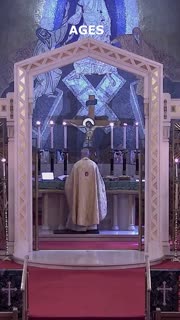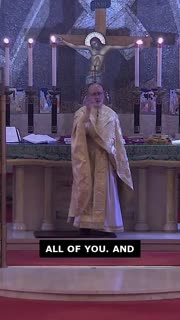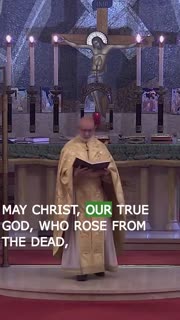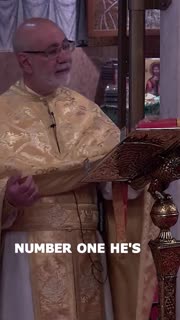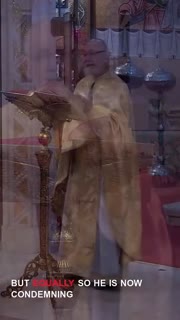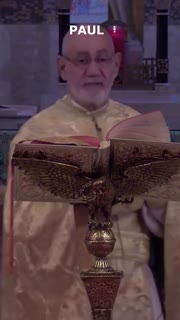Hope and Compassion: Jesus' Healing of the Paralytic
Devotional
Sermon Summary
Bible Study Guide
Sermon Clips
### Quotes for outreach
1. "For the heavenly peace, for the salvation of our souls, let us pray to the Lord. For the peace of the whole world, the stability of the holy churches of God, for the oneness of all, let us pray to the Lord. For this holy house, for those who enter it with faith, reverence, and the fear of God, let us pray to the Lord." [02:14] (22 seconds)
2. "Help us, save us, have mercy on us, and keep us, O God, by Thy grace. Remembering our most holy, pure, blessed, and glorious Lady, the Theotokos, and ever-Virgin Mary, with all the saints, let us commit ourselves and one another in our whole life unto Christ our God." [03:45] (22 seconds)
3. "For you are God and you are holy and unto you we offer up glory to the Father and to the Son and to the Holy Spirit. Now and forever and unto the ages of ages. Amen. Let us be attentive." [06:19] (60 seconds)
4. "And may the mercies of our great God and Savior, Jesus Christ, be with all of you. And with your spirit. Amen. And may the mercies of our great God and Savior, Jesus Christ, be with you." [34:55] (21 seconds)
5. "May Christ, our true God, who rose from the dead, and through the intercession of his most pure and holy mother, through the power of the precious life-giving cross, through the protection of the honorable Bives' heavenly powers, through the supplication of the honorable, glorious prophet and forerunner, John the Baptist, through the holy, glorious and renowned apostles, through the holy, glorious and victorious martyrs, of our venerable and God-bearing fathers, through the holy, righteous and essential Lord, and of the synopsis of the apostles, whose memory commemorates the name of all the saints. Have mercy on us and save us, for you are a good God who loves mankind." [55:38] (28 seconds)
### Quotes for members
1. "So on this sixth Sunday of Matthew we have an interesting contrast here and I'm just I'm reading the beginning again and he tells the paralytic take heart my son your sins are forgiven but then immediately following that what do we hear okay we hear now the scribes and the Pharisees now condemning him or at least in their minds and Jesus again the all-knowing says why do you think evil things in your heart." [43:13] (42 seconds)
2. "Number one he's telling those of us who are suffering and who are in despair that don't give up hope don't despair take heart because I as God am here not only to forgive your sins but to grant you the strength and the comfort from the comfort that I have sent to you i.e the Holy Spirit." [43:13] (23 seconds)
3. "But equally so he is now condemning those of us many times who say and think evil things and become judgmental now this doesn't mean that we should never judge Saint Paul tells us many times that we should we should judge our brother how though in the sense if they are doing something that is against what our Christian moral principles are that we're allowed to call that person out." [43:13] (31 seconds)
4. "We do it Saint Paul gives us instructions he says call us out call them out first in private and then call them out in public and then call them out you know in the uh in in the church setting so we don't have this idea of don't judge I know that sometimes we hear the idea of well take the log out of your own eye before you judge one somebody else." [43:13] (24 seconds)
5. "So I love this particular gospel because of that wonderful contrast that we have here between us in despair and telling us don't despair take heart and then on the other side we have Jesus who also warns us and says let us not be like those those scribes and Pharisees who judge other people without knowing what their condition and what their story is." [44:59] (30 seconds)
Ask a question about this sermon
1. "For the heavenly peace, for the salvation of our souls, let us pray to the Lord. For the peace of the whole world, the stability of the holy churches of God, for the oneness of all, let us pray to the Lord. For this holy house, for those who enter it with faith, reverence, and the fear of God, let us pray to the Lord." [02:14] (22 seconds)
2. "Help us, save us, have mercy on us, and keep us, O God, by Thy grace. Remembering our most holy, pure, blessed, and glorious Lady, the Theotokos, and ever-Virgin Mary, with all the saints, let us commit ourselves and one another in our whole life unto Christ our God." [03:45] (22 seconds)
3. "For you are God and you are holy and unto you we offer up glory to the Father and to the Son and to the Holy Spirit. Now and forever and unto the ages of ages. Amen. Let us be attentive." [06:19] (60 seconds)
4. "And may the mercies of our great God and Savior, Jesus Christ, be with all of you. And with your spirit. Amen. And may the mercies of our great God and Savior, Jesus Christ, be with you." [34:55] (21 seconds)
5. "May Christ, our true God, who rose from the dead, and through the intercession of his most pure and holy mother, through the power of the precious life-giving cross, through the protection of the honorable Bives' heavenly powers, through the supplication of the honorable, glorious prophet and forerunner, John the Baptist, through the holy, glorious and renowned apostles, through the holy, glorious and victorious martyrs, of our venerable and God-bearing fathers, through the holy, righteous and essential Lord, and of the synopsis of the apostles, whose memory commemorates the name of all the saints. Have mercy on us and save us, for you are a good God who loves mankind." [55:38] (28 seconds)
### Quotes for members
1. "So on this sixth Sunday of Matthew we have an interesting contrast here and I'm just I'm reading the beginning again and he tells the paralytic take heart my son your sins are forgiven but then immediately following that what do we hear okay we hear now the scribes and the Pharisees now condemning him or at least in their minds and Jesus again the all-knowing says why do you think evil things in your heart." [43:13] (42 seconds)
2. "Number one he's telling those of us who are suffering and who are in despair that don't give up hope don't despair take heart because I as God am here not only to forgive your sins but to grant you the strength and the comfort from the comfort that I have sent to you i.e the Holy Spirit." [43:13] (23 seconds)
3. "But equally so he is now condemning those of us many times who say and think evil things and become judgmental now this doesn't mean that we should never judge Saint Paul tells us many times that we should we should judge our brother how though in the sense if they are doing something that is against what our Christian moral principles are that we're allowed to call that person out." [43:13] (31 seconds)
4. "We do it Saint Paul gives us instructions he says call us out call them out first in private and then call them out in public and then call them out you know in the uh in in the church setting so we don't have this idea of don't judge I know that sometimes we hear the idea of well take the log out of your own eye before you judge one somebody else." [43:13] (24 seconds)
5. "So I love this particular gospel because of that wonderful contrast that we have here between us in despair and telling us don't despair take heart and then on the other side we have Jesus who also warns us and says let us not be like those those scribes and Pharisees who judge other people without knowing what their condition and what their story is." [44:59] (30 seconds)


